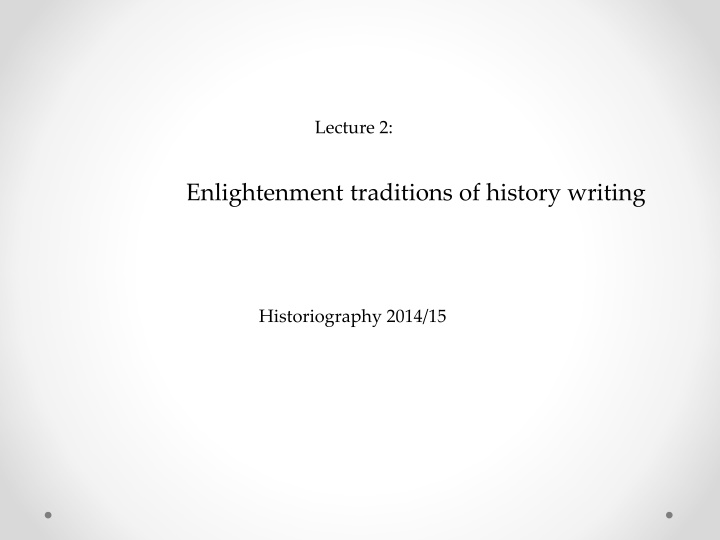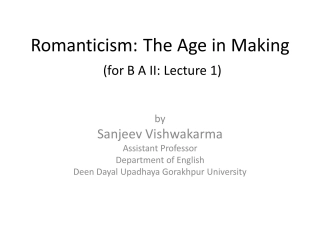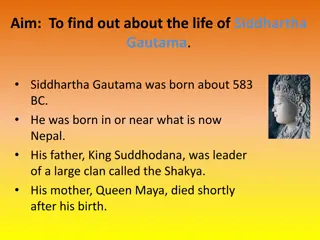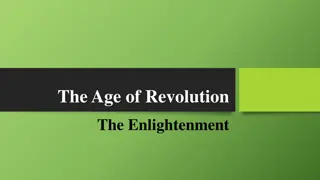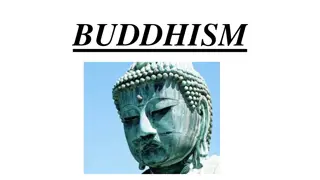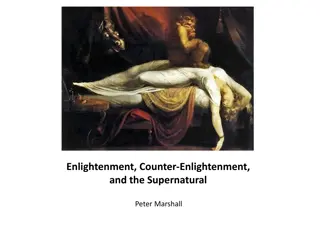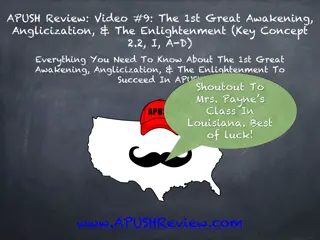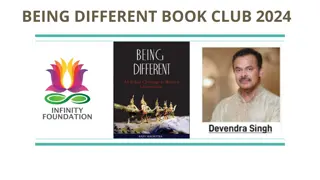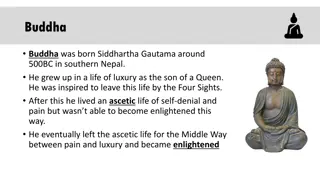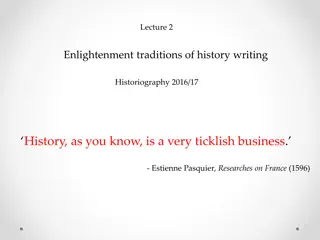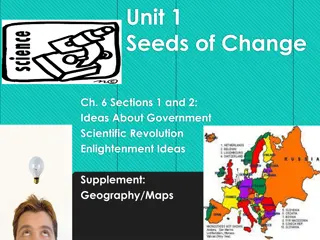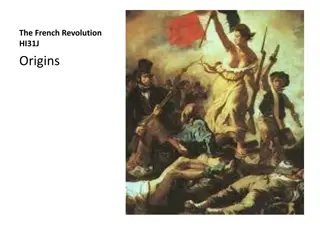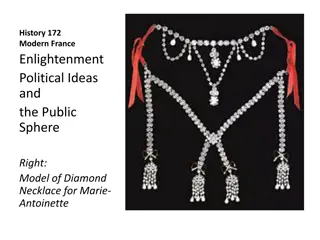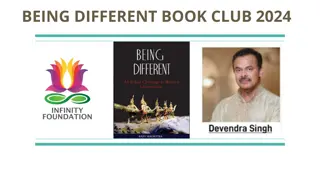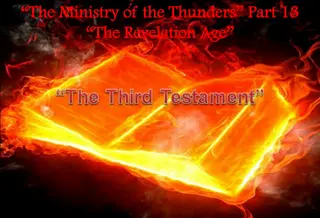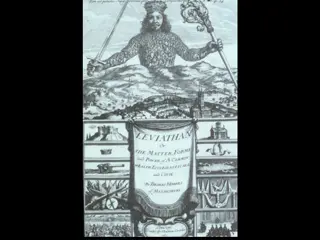Enlightenment Traditions of History Writing
This content delves into Enlightenment philosophies by Immanuel Kant and David Hume, highlighting the transition from self-incurred immaturity to independent reasoning known as Enlightenment. Kant's call to "Have the courage to use your own understanding" embodies the essence of this intellectual movement, emphasizing the pursuit of reason and freedom from external guidance. The emergence of critical thinking and challenges to conventional beliefs characterize this era, paving the way for the Age of Enlightenment.
Download Presentation

Please find below an Image/Link to download the presentation.
The content on the website is provided AS IS for your information and personal use only. It may not be sold, licensed, or shared on other websites without obtaining consent from the author.If you encounter any issues during the download, it is possible that the publisher has removed the file from their server.
You are allowed to download the files provided on this website for personal or commercial use, subject to the condition that they are used lawfully. All files are the property of their respective owners.
The content on the website is provided AS IS for your information and personal use only. It may not be sold, licensed, or shared on other websites without obtaining consent from the author.
E N D
Presentation Transcript
Lecture 2: Enlightenment traditions of history writing Historiography 2014/15
Enlightenment is mankinds exit from self- incurred immaturity. Immaturity is the inability to make use of one s own understanding without the guidance of another. Self-incurred is the inability if its cause lies not in the lack of understanding but rather in the lack of the resolution and the courage to use it without the guidance of another. Sapere aude! Have the courage to use your own understanding! It is thus the motto of the enlightenment. (From: Immanuel Kant, An Answer to the Question: What is Enlightenment? Berlinerische Monatsschrift (1784): 481-494, 481.)
It is now asked whether we live at present in an enlightened age? , the answer is: No, but we do live in an age of enlightenment. As matters stand now, much is still lacking for men to be completely able or even to be placed in a situation where they would be able to use their own reason confidently and properly in religious matters without the guidance of another. Yet we have clear indications that the field is now being opened from them to work freely towards this , and the obstacles to general enlightenment or to the exit out of their self-incurred immaturity become even fewer. From: Immanuel Kant, An Answer to the Question: What is Enlightenment? Berlinerische Monatsschrift (1784): 481-494, 481
It is now asked whether we live at present in an enlightened age? , the answer is: No, but we do live in an age of enlightenment. As matters stand now, much is still lacking for men to be completely able or even to be placed in a situation where they would be able to use their own reason confidently and properly in religious matters without the guidance of another. Yet we have clear indications that the field is now being opened from them to work freely towards this , and the obstacles to general enlightenment or to the exit out of their self-incurred immaturity become even fewer. From Immanuel Kant, An Answer to the Question: What is Enlightenment? Berlinerische Monatsschrift (1784): 481-494, 481
A Treatise of Human Nature: Being an Attempt to introduce the experimental Method of Reasoning into Moral Subjects (1739) The History of England: from the invasion of Julius Caesar to the Revolution of 1688 (1754 61) , first published in installments I believe this is the historical Age and this the historical Nation , 1777 David Hume 1711-1767,
Antiquarianism a man strangely thrifty of Time past, and an enemy indeed to this maw, whence he fetches out many things when they are now all rotten and stinking. Hee is one that hath that unnaturall disease to bee enamour'd of old age and wrinckles, and loves all things (as Dutchmen doe Cheese) the better for being mouldy and worme-eaten. (John Earle, Micro-Cosmographie: or A Peece of the World Discovered (7th edn., London, 1660), p. 33)
History of Charles XII, King of Sweden (1731) The Age of Louis XIV (1751) Candide, or Optimism, 1759 Essay on the Manners of Nations (or 'Universal History') (1756) History is the narrative of facts taken to be true, in contrast to the fable which is the narrative of facts taken to be false. Fran ois-Marie Arouet, 1694-1778, known as Voltaire From: Histoire , p. 164
Why study history according to Hume: 1. Entertainment 2. Leads to erudition and improvement of the mind A man acquainted with history may, in some respects, be said to have lived from the beginning of the world, and to have been making continual additions to his stock of knowledge in every century. (knowledge is accumulative) 3. History has the power to direct readers wills and to become more virtuous; because historian do not possess the vice of self-love or self-interest
Lectures on Rhetoric and Belles Lettres, 1762: The accidents which affect the human Species interest us greatly by the sympatheticall affections they raise in us. We enter into their misfortunes, grieve when they grieve, rejoice when they rejoice, and in a word feel for them in some respect as if we ourselves were in the same condition. ( p. 90) The facts must be real otherwise they will not assist us in our future conduct, by pointing us the means to avoid or produce any event. Feigned Event and the Causes contrived from them, as they did not exist, can not inform us of what happened in former times, nor of consequences assist us in a plan of future conduct. (p. 91) Adam Smith, 1723-1790
The Queen, worn out with fatigue, covered with dust, and bedewed with tears, was exposed as a spectacle to her own Subjects. (History of Scotland, 1759, vol. 1, p. 367) William Robertson, 1721-1793
Laws of Nature Hume: Experimental method of reasoning: the empirical observation of human activities in the present and past. Mankind are so much the same, in all times and places, that history informs us of nothing new or strange in this particular. Its chief use is only to discover the constant and universal principles of human nature, by showing mean in all varieties of circumstances and situations and furnishing us with materials from which we may form our observations and become acquainted with the regular spring of human action and behaviour (Hume, Enquiry Concerning Human Understanding, pp. 83-4) Isaac Newton, 1642-1726
An Essay on the History of Civil Society,1767 Mankind are to be taken in groups, as they have always subsisted. The history of the individual is but a detail of the sentiments and thoughts he has entertained in the view of his species: and every experiment relative to this subject should be made with entire societies, not with single men. (p.6) I if we are asked therefore, Where the state of nature is to be found? we may answer, It is here; and it matters not whether we are understood to speak in the island of Great Britain, at the Cape of Good Hope, or the Straits of Magellan. While this active being is in the train of employing his talents, and of operating on the subjects around him, all situations are equally natural. (Ferguson, Essay, pp. 11 12) Adam Ferguson, 1723-1816
Stage history 1.Hunting no property, no wealth to accumulate, stage of savagery 2. Pasterage less mobile but still nomadic, wealth can be accumulated 3.Agriculture -- even less mobile, farmer live on land in own houses, more wealth and greater inequality 4. Commerce property ownership, laws governing property, complex societies Conjectural History
Scienza Nuova, 1725 The criterion and rule of the true is to have made it. Accordingly, our clear and distinct idea of the mind cannot be a criterion of the mind itself, still less of other truths. For while the mind perceives itself, it does not make itself. Giambattista Vico, 1668-1744
